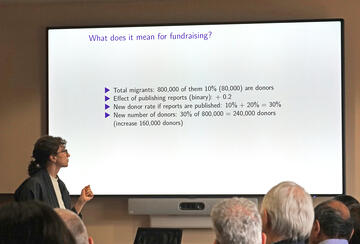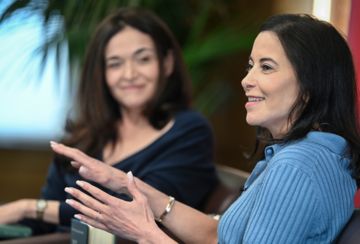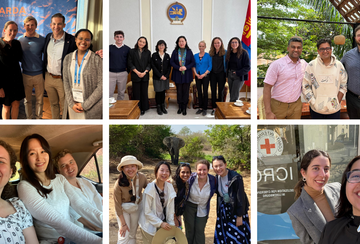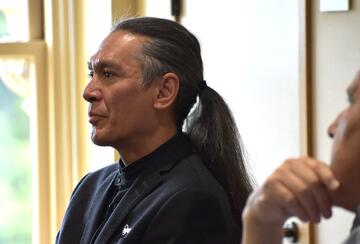News

Makoto Nagasawa, a doctoral researcher at the University of Tokyo’s Graduate School of Education, reflects on his experience in the SPICE-linked intensive seminar in the San Francisco Bay Area, led by Professor Hideto Fukudome.

CDDRL Postdoctoral Fellow Ivetta Sergeeva’s research on the Russian diaspora’s willingness to donate to oppositional organizations demonstrates that the criminalization of groups can incentivize greater donor support among emigrants, contrary to the Putin regime’s intentions.

As strategic uncertainty deepens and traditional alliances are tested, APARC’s Japan Program and the United States-Japan Foundation brought together thought leaders at Stanford to explore the shifting bilateral cooperation across areas spanning global democracy, economic resilience, civil society and governance, and the unexpected power of baseball diplomacy.

Jeff Hancock Offers Key Takeaways From the 2025 Stanford Youth Safety and Digital Wellbeing Report
The Report is a product of a workshop, co-hosted by the Stanford Center for Digital Health and the Social Media Lab.

Political Signaling in an Uncertain World: Brandon Yoder’s Empirical Lens on Chinese Foreign Policy
Brandon Yoder, APARC’s 2024–25 Stanford Next Asia Policy Fellow, focuses on a central challenge in international politics: how states can credibly signal their intentions and avoid war. His work investigates this question in high-stakes contexts, such as during power shifts, amid strategic uncertainty, and in multi-actor settings where traditional signaling models often fall short.

Applications are open for CSP’s “Introduction to Contemporary China” course. Interested students must apply by June 15, 2025.

Professor Maggiori joined SCCEI and Stanford Libraries to discuss how the U.S. and China apply economic pressure to achieve their political and economic goals, and the economic costs and benefits that this competition is imposing on the world.
The Stanford Youth Safety and Digital Wellbeing Report addresses the increasingly complex conversation around social media and youth wellbeing.
Students from the Ford Dorsey Master's in International Policy Class of 2025 visited organizations around the world to tackle pressing policy challenges such as human trafficking, cyber threats, disinformation, and more.

President Trump's tariff policy will serve no one's interests, says Thomas Fingar, a Shorenstein APARC Fellow at Stanford University's Freeman Spogli Institute for International Studies.
Janka Deli, the 2024-25 Gerhard Casper Predoctoral in Rule of Law, has been named the co-winner of the first annual Interest Group on International Law and Social Science (ILASS) Best Workshop Paper Prize, awarded by the American Society of International Law (ASIL), for her paper, "Economic Growth Despite the Erosion of the Rule of Law?"
A new Stanford study indicates that millions of individuals in the United States could lose guaranteed, no-cost preventive health services if the U.S. Supreme Court upholds a lower court ruling.

In a conversation about her new book, former deputy national security advisor Dina Powell McCormick explained why mentorship is one of the most powerful forces that can shape a leader’s path forward.
More than one in seven adults in the United States are believed to have chronic kidney disease, with the burden disproportionately impacting Black and Hispanic adults. A new Stanford study suggests a population-wide CKD screening could reduce these disparities.

Deepening Understanding: Insights from SPICE/Waseda Intensive Course on Peacebuilding in East Asia
Graduate student Geunhyung Kim reflects on her experience participating in the SPICE/Stanford-Waseda intensive course.
At a recent lunch seminar at CPC, Amy Zegart discussed emerging technologies and their impact on geopolitics, focusing on aspects of U.S. foreign policy

In the wake of widespread challenges to affirmative action policy, Stanford Political Scientist Soledad Artiz Prillaman’s research challenges the notion that electoral quotas for minority representation weaken candidate quality.
SML will contribute expertise and guidance for the recently passed Social Media Minimum Age legislation, set to take effect end of 2025.
US Research in Retreat?
Zealous measures to defend against foreign exploitation of university-based research would be inadequate to preserve US preeminence in science and technology without much greater effort to strengthen US capabilities.
The former deputy national security advisor for cyber and emerging technology will guest lecture, collaborate with Freeman Spogli Institute faculty, mentor students and fellows, and advance her own research during her time at Stanford.
At a fireside chat hosted by APARC's Southeast Asia Program, Kim Aris, the son of Daw Aung San Suu Kyi, called for humanitarian aid to Myanmar, his mother’s release, and freedom for the Burmese people.

Participants deliberated on ‘how should AI agents provide proactive, personalized experiences for users?’ and ‘how should AI agents and users interact?’
Tsutsui, whose research focuses on globalization, human rights, social movements, and political sociology, currently serves as deputy director of the center, and has been the director of the Japan Program since 2020.
We spoke with Research Scholar Lingsheng Meng to learn more about his journey from studying economics in Beijing to conducting cutting-edge research on some of China’s most pressing policy issues.

Congratulations to the students who have been named our top honorees and honorable mention recipients for 2024.
















